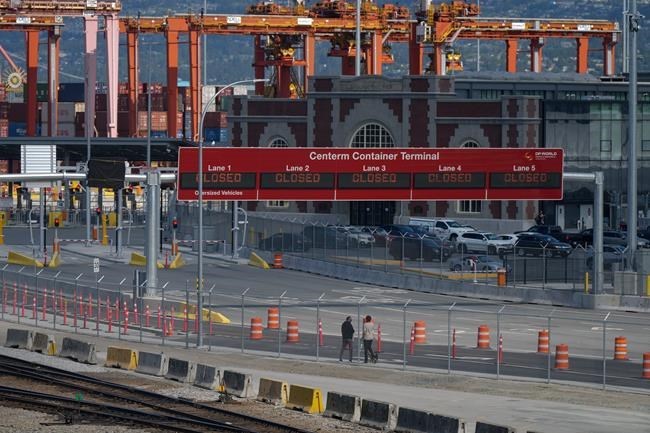VANCOUVER — A source close to negotiations over the British Columbia port strike said both sides on Wednesday received the terms of a settlement recommended by a federal mediator that could end the 12-day-old industrial action.
The delivery of the terms came after federal Labour Minister Seamus O'Regan late Tuesday instructed the mediator to send him the terms within 24 hours so he could forward them to the International Longshore and Warehouse Union saąúĽĘ´«Ă˝ and the saąúĽĘ´«Ă˝ Maritime Employers Association.
The two sides have 24 hours upon receiving the recommendations to decide whether or not to ratify the agreement.
Neither side confirmed they have received the terms.
British Columbia business groups said there's no guarantee the strike will end quickly despite O'Regan's move.
The groups, including the Greater Vancouver Board of Trade, the saąúĽĘ´«Ă˝ Council of Forest Industries, the saąúĽĘ´«Ă˝ Chamber of Commerce and the Mining Association of saąúĽĘ´«Ă˝, said at an event in Vancouver on Wednesday that they are continuing to call for federal back-to-work legislation to end the strike involving 7,400 dock workers at more than 30 ports, including saąúĽĘ´«Ă˝'s busiest, the Port of Vancouver.
"While we hold some hope that a deal can be reached, the reality is that if either party opts out, we will have added $1.6 billion to the trade disrupted and be back in the exact same place," said Board of Trade president and CEO Bridgitte Anderson.
"Every single hour and every single day that this labour dispute goes on, we are putting our international reputation at risk, we are putting jobs at risk, and it's also hurting our economy."
Anderson said an estimated $8.9 billion in trade has been disrupted since the strike began, and 63,000 shipping containers are "waiting on the water to be unloaded" at saąúĽĘ´«Ă˝ ports.
That number could balloon to 245,000 by the end of July if the strike isn't resolved by then, she said.
O'Regan said Tuesday the gap between the workers' and employers' positions was "not sufficient to justify a continued work stoppage."
The mediator's recommended terms are non-binding, and either side can vote to reject them.
saąúĽĘ´«Ă˝ Premier David Eby said at the close of a premiers' meeting in Winnipeg on Wednesday that the strike cannot drag on.
"This isn't just the Port of Vancouver, it's the port of Saskatchewan, it's the port of Alberta and it's the port of Manitoba," Eby said. "So it's critically important infrastructure for Canadians, for people who go to work in industries where those goods are exported globally.
"It has a profoundly damaging impact across the country on workers who are also trying to feed their families right now."
But Eby also said the union's concerns about inflation and rising costs of living are real, and there was a need for striking port workers to "be treated fairly."
Saskatchewan Premier Scott Moe said his province's potash customers could soon take their business to Russia and Belarus if the dispute continues.
"Today, it might be easier for you to get a ton of Russian potash fertilizer than it is to get a ton of Saskatchewan potash fertilizer," Moe said. "So the impacts are much broader than what's happening just at the port there."
On Tuesday, Nutrien Ltd. said it had curtailed production at its Cory potash mine in Saskatchewan due to the strike.
Alberta Premier Danielle Smith said if businesses can't get their goods to markets because of the strike, saąúĽĘ´«Ă˝ could start to lose international customers.
Michael Goehring, president and CEO of the Mining Association of saąúĽĘ´«Ă˝, said some customers from foreign markets have been asking about the port strike and when it will end.
Goehring said some member mines have diverted shipments to other ports, while others resort to stockpiling products on-site or in railcars.
"There are physical and financial limits to how long mines can continue to do this," he said. " … If the strike continues for much longer, some of our members will have to start planning for shutdowns and temporary layoffs."
The saąúĽĘ´«Ă˝ business groups on Wednesday launched a real-time "Port Shutdown Calculator" to show what they say is the cumulative cost of the strike.
Fiona Famulak, president and CEO of the saąúĽĘ´«Ă˝ Chamber of Commerce, said Canadian consumers would begin feeling the wider impact of the shutdown "in a matter of days" if they did not already.
"We have an affordability issue here in British Columbia," Famulak said. "The strike is going to make that worse. We have a housing issue here in British Columbia, and the delay on raw materials whether it's steel for rebar, whether it's component parts, whether it's hard goods, will delay construction schedules.
"It will delay delivery of industrial, commercial and residential residences. It will result probably in higher cost to renters and higher cost to those looking to purchase."
This report by The Canadian Press was first published July 12, 2023.
The Canadian Press



